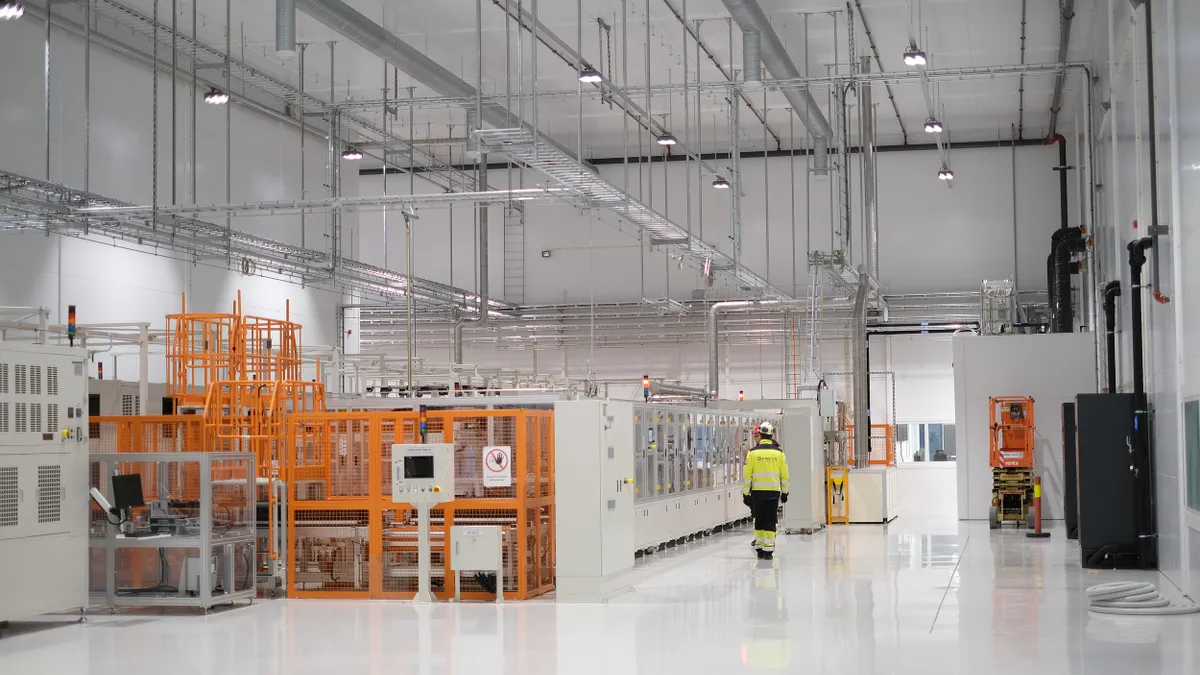Dive Brief:
- Freyr on Tuesday announced it is considering plans to form a nonbinding alliance intended to scale up sustainable battery production. The company’s four potential partners are Texas-based Caterpillar, Swiss company Glencore, German company Siemens and the Nidec Corp. in Japan.
- The potential coalition is intended to decarbonize the battery-making process and accelerate the energy transition across key sectors, Freyr said. The company sees its fellow coalition members as partners in producing batteries and as potential customers.
- Freyr is a relatively new entrant to the battery market. The company celebrated the opening of its first factory on Tuesday in Mo i Rana, Norway. Freyr plans to open two more factories in Norway and Georgia.
Dive Insight:
Jeffrey Spittel, Freyr Battery’s vice president of investor relations, said the company plans to make batteries for electric vehicles and energy storage, along with batteries for manufacturing.
Many of the details of the possible agreement have yet to be worked out, he said. But the goals include making batteries for the clean energy sector and reducing carbon emissions from the battery-making process.
The Luxembourg-based Freyr wants to provide those batteries on an industrial scale with the help of its four prospective partners who will help the company develop an efficient supply chain and serve as potential customers, Spittel said.
“I would expect them to be partners along the supply chain,” Spittel said. “They can [also] be customers, they can be investors, they can be a number of different things. These were the first four companies that were willing to step forward publicly (to work with Freyr). We expect there [are] going to be more.”
Representatives from each of those four companies attended the plant opening in Norway on Tuesday, Spittel said in a phone interview.
“We’re trying to do it with a cleaner supply chain,” Spittel said, noting that the Mo i Rana facility runs on hydroelectric power.
Each partner will contribute in different ways, he said. Nidec, for example, will help Freyr build battery modules in Norway.
"We bring the scale and expertise necessary to bring battery integration into a broad range of markets," Caterpillar Senior Vice President Rod Shurman said in a tweet.
"The world of tomorrow will look very different, with new sources of energy and greater levels of connectivity," Glencore said in a statement on LinkedIn. "The metals we produce, source and market will support the global ambition for a low carbon future."
Possible areas of collaboration include battery cell manufacturing; pack and module integration; digital and software services; mining and refining; power market stationary storage applications; electric transportation; and recycling/end-of-life solutions
Spittel described the potential partnership as a “multi-year initiative.” The company has a timeline in mind, but he said he couldn’t share it yet.
Freyr’s Mo i Rana factory will produce sample cells and serve as a training ground for the company’s green energy ambitions, Spittel said. The bulk of the company’s battery production will take place at the planned factories in Norway and Georgia.
Battery production is ramping up across the globe as companies tackle energy storage to accommodate clean energy technologies, noted Michael Fowler, a professor of chemical engineering at the University of Waterloo and the school’s Canada Research Chair in Zero-emissions Vehicles and Hydrogen Energy Storage Systems.
South Korean battery-maker LG Energy, for example, announced on March 24 a $5.5 billion investment in a battery complex in Queen Creek, Arizona.
“These are positive announcements,” Fowler said.














